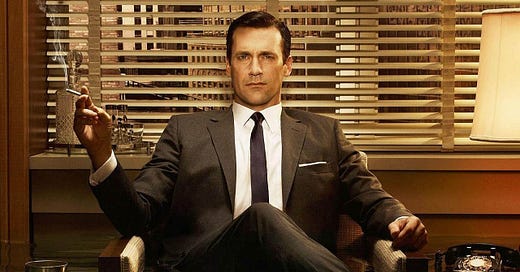
Building a startup is never a losing bet
A new business is risky just like gambling, except you only have upside — even if you fail.
This week marks four months since starting a business.
It’s been the best and most enlightening chapter of my professional life so far. One reason I’ve found building Opening Bell Daily so rewarding is because I’m doing all the things I wasn’t able to in my old job at Business Insider.
That’s not to say I think every reporter in a legacy outlet should be involved in sales, marketing, branding, and business development. Most journalists want nothing to do with any of that. Most actually prefer to be siloed into a specific beat.
I’ve always been interested in learning how to do and be everything — in journalism and beyond — which is why this has worked for me. I’ve relished wearing the many hats of a founder.
Still, in a startup it’s hard to know when you’re making progress. There’s no existing infrastructure, promotions, or indicators from middle management to tell you how you are doing.
Some weeks I feel like I’ve accrued enough wins to conquer the world. Other times I feel a stupendous sense of doom.
What has reassured me though is the sense that I’m not only taking a risk of my own choosing, but that the risk itself is productive. It is a risk to start any business, and productivity helps ensure the business doesn’t die.
Because Opening Bell Daily is indeed not dead, the market is signaling that what we are doing is productive and useful. That’s capitalism.
The more I speak with other founders, the more I realize how intertwined the entrepreneurial spirit is with American culture. The latter is built upon the former — so much so that there is almost no reputational hit when your business fails here.
People around the world work their whole lives just to get the opportunity to move to the US and build something.
Among the founders I admire most are those with false starts and ventures that didn’t work. People will always ask about the initial leap of faith, even if the vision falls short later. Whether a new business succeeds is not what inspires others to action. It’s the starting that counts.
On the topic of risk, something that keeps injecting itself into my work as a financial reporter is the rise of betting platforms and prediction markets. Scratching the gambling itch is also very American. The technology isn’t new, but this form of risk does seem to be an increasingly popular way to spend (and lose) money.
The enthusiasm seen among sports bettors has ballooned across new platforms like Polymarket and Kalshi, which allow members to bet on random, niche events across pop culture and politics.
I saw today that Kalshi has a market you can wager on titled “What will Kamala say in August?” People have bet tens of thousands of dollars for her to utter “coconut,” “unburdened,” and “Venn diagram.”
Gambling is a silly type of risk-taking, but it’s thriving so much that it’s become a regular character in the cast for the financial press. Like starting a business, it offers the promise of exponential returns and unpredictable outcomes.
The difference, however, is that there’s no pride to be found in losing money on a betting platform. It doesn’t make a good story and it doesn’t inspire.
Meanwhile, you can start a business, watch it implode, and still have the respect of others who have attempted the same.
In writing, there is an idea that your first book is only a success if you go on to write another. Anyone can do anything one time, the thinking goes. It’s persistence that offers a more reliable heuristic for success.
There are entrepreneurs who hold a similar view when it comes to starting businesses. The losses or winnings of a first venture will only define you if you stop there.
Yes, building a startup presents risk. But working for someone else isn’t exactly full-proof. That someone else will give you healthcare and vacation days, but only if you operate on their schedule in exchange.
Oh. They can also fire you — a particularly frequent and prickly occurrence in media.
I like work and always have. In my last job, I’d clock in at 7:30 AM. These days I start even earlier, despite no one telling me to do so. I could start work at noon if I wanted to. I don’t, but I like that it’s an option.
I started writing newsletters six years ago on my own without formal training. That opened the door for me to write them professionally under multiple editors. Now I’m back to doing them on my own, in part because I felt staying in a big corporation protected my downside more than it maximized my upside. That’s not what I want at 27 years old.
To be clear, early coaching helped me get to today. Business Insider kept me from doing or saying anything too stupid. It’s amazing how much progress you can make simply by avoiding mistakes. Play with guardrails long enough though and nothing will make you want to seek risk more.
I wonder how much of the sports gambling boom stems from it being illegal for so long until recently.
To recap:
Building a business pays even when it fails because it shows yourself and others that you can do hard things.
Gambling is a fun way to spend money but an unreliable way to make money.
Sign up for Opening Bell Daily if you want the best financial newsletter in your inbox every morning.











